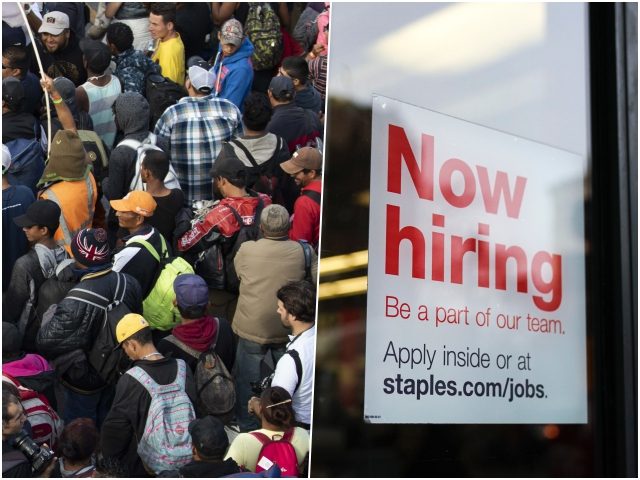Increasing legal immigration levels beyond the already roughly 1.2 million legal immigrants who are admitted to the United States every year would subject the remaining unemployed population, discouraged U.S. workers, and those not yet in the labor force to more foreign competition in their efforts to find jobs.
This week, President Trump endorsed the notion that the big business lobby and outsourcing firms have continuously claimed for decades, that there are not nearly enough Americans for the number of jobs in the country or that Americans are unwilling to do manual labor and blue-collar jobs.
The claim was Trump’s evidence for his sudden endorsement of increasing legal immigration levels, a break from his 2015, 2016, and 2017 “America First” commitment wherein he noted how mass legal immigration hurts the wages and job prospects of American workers.
“We need people in our country because our unemployment numbers are so low and we have massive numbers of companies coming back into our country,” Trump reportedly told the media.
“I need people coming in because we need people to run the factories and plants and companies that are moving back in,” Trump said. “We need people.”
Despite the claims, the country is hardly at full employment, so increased importation of foreign workers and legal immigrants would subject the roughly 13.2 million Americans — those who are unemployed, not in the labor force but want a job, and who are working part-time but want full-time work — to more foreign competition.
The U.S. unemployment rate edged up in January to about four percent. This translates to about 6.5 million Americans who are unemployed across the nation and who want a job. About 12.9 percent of these unemployed Americans are teenagers who generally are forced to compete against imported low-skilled foreign workers for entry level jobs.
Additionally, there remain about 6.8 percent of black Americans — also more likely to compete for jobs against legal immigrants and foreign workers — who are unemployed and who want a job. This is nearly double what the total national unemployment rate was in November 2018.
Aside from the millions of Americans counted in the most recent unemployment total, there are 1.6 million Americans who are not in the labor force at all but who want good-paying jobs.
“These individuals were not in the labor force, wanted and were available for work, and had looked for a job sometime in the prior 12 months,” the Bureau of Labor Statistics notes.
Of these 1.6 million Americans not in the labor force, about 426,000 are considered “discouraged workers” as they are Americans who are currently not looking for work because they believe there are no jobs available for them.
In addition to these 8.1 million Americans who are unemployed or who are not in the labor force, there are 5.1 million Americans who are working part-time jobs but who want full-time jobs. More than 1.4 million of these U.S. part-time workers said they had looked for full-time jobs but could not find any.
The job prospects of these more than 13 million Americans would be further diminished by an increase in legal immigration levels, as such a plan subjects them to additional foreign competition. Increasing legal immigration would also put more downward pressure on the millions of Americans who are currently employed.
Every one percent increase in the immigrant composition of an American workers’ occupation reduces their weekly wages by about 0.5 percent, researcher Steven Camarotta concludes. This means the average native-born American worker today has their wage reduced by perhaps 8.5 percent because of current legal immigration levels.
Likewise, every one percent increase in the immigrant composition of low-skilled U.S. occupations reduces wages by about 0.8 percent. Should 15 percent of low-skilled jobs be held by foreign-born workers, it would reduce the wages of native-born American workers by perhaps 12 percent.
The Washington, DC-imposed mass legal immigration policy is a boon to corporate executives, Wall Street, big business, and multinational conglomerates, as America’s working and middle class have their wealth redistributed to the country’s top earners through wage stagnation.
John Binder is a reporter for Breitbart News. Follow him on Twitter at @JxhnBinder.

COMMENTS
Please let us know if you're having issues with commenting.